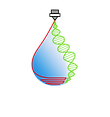BioSensors
Biosensors can be used in a wide range of applications, including medical applications. In our lab, we aim to create and improve biosensors, to facilitate the discovery of abnormalities.
PROJECTS
Development of Saliva-based Cortisol Biosensors using Smartphone-based Image Analysis
Developing devices for point-of-care analysis of salivary cortisol has become important to identify environmental and behavioural triggers towards stress. Saliva-based cortisol sensing has the advantage of obtaining samples in a non-invasive and minimal discomfort to the specimen, minimizing any additional stress. Lateral flow assays (LFA) lines can then be measured using image processing techniques to quantify the concentration of cortisol in the salivary sample.
Development of a Low-cost Portable Sensor for Detection of Tetrahydrocannabinol (THC) in Saliva
A point-of-care device that is able to measure the THC levels in a quick and efficient manner is needed. This includes having a portable size and a simple user interface. This project includes the development of a prototype of a THC breathalizer.
Development of a low-cost, portable, and noninvasive oyster heartbeat monitor
Aquaculture is an essential component of Prince Edward Islands economy. One portion of it is dedicated to oyster farming, which is greatly influenced by environmental conditions, such as seasonal temperatures and water salinity. One method to characterize oysters wellbeing is through the measurement of their heartbeats. This piezoelectric device enables a cost-effective, noninvasive solution.

Development of a Non-invasive Point-of-care Hematocrit Sensor for Anemia Detection
A hemotocritsensor was designed, with the ability to be non-invasive. In addition, it is a portable, point-of-care device that enables a fast and efficient manner of determining if a patient is anemic.